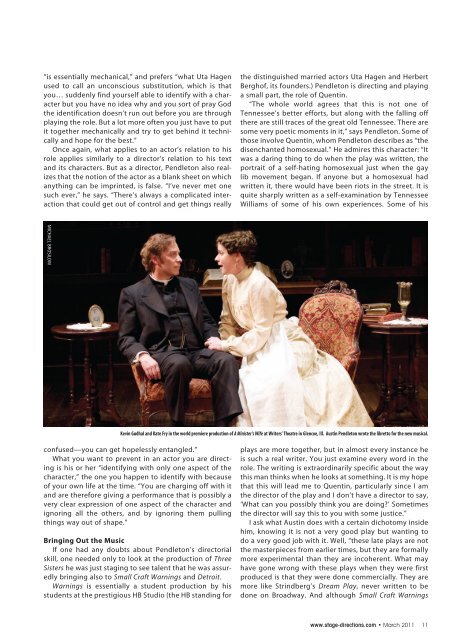Country Teamwork - Stage Directions Magazine
Country Teamwork - Stage Directions Magazine
Country Teamwork - Stage Directions Magazine
- No tags were found...
You also want an ePaper? Increase the reach of your titles
YUMPU automatically turns print PDFs into web optimized ePapers that Google loves.
“is essentially mechanical,” and prefers “what Uta Hagenused to call an unconscious substitution, which is thatyou… suddenly find yourself able to identify with a characterbut you have no idea why and you sort of pray Godthe identification doesn’t run out before you are throughplaying the role. But a lot more often you just have to putit together mechanically and try to get behind it technicallyand hope for the best.”Once again, what applies to an actor’s relation to hisrole applies similarly to a director’s relation to his textand its characters. But as a director, Pendleton also realizesthat the notion of the actor as a blank sheet on whichanything can be imprinted, is false. “I’ve never met onesuch ever,” he says. “There’s always a complicated interactionthat could get out of control and get things reallythe distinguished married actors Uta Hagen and HerbertBerghof, its founders.) Pendleton is directing and playinga small part, the role of Quentin.“The whole world agrees that this is not one ofTennessee’s better efforts, but along with the falling offthere are still traces of the great old Tennessee. There aresome very poetic moments in it,” says Pendleton. Some ofthose involve Quentin, whom Pendleton describes as “thedisenchanted homosexual.” He admires this character: “Itwas a daring thing to do when the play was written, theportrait of a self-hating homosexual just when the gaylib movement began. If anyone but a homosexual hadwritten it, there would have been riots in the street. It isquite sharply written as a self-examination by TennesseeWilliams of some of his own experiences. Some of hisMichael BrosilowKevin Gudhal and Kate Fry in the world premiere production of A Minister’s Wife at Writers’ Theatre in Glencoe, Ill. Austin Pendleton wrote the libretto for the new musical.confused—you can get hopelessly entangled.”What you want to prevent in an actor you are directingis his or her “identifying with only one aspect of thecharacter,” the one you happen to identify with becauseof your own life at the time. “You are charging off with itand are therefore giving a performance that is possibly avery clear expression of one aspect of the character andignoring all the others, and by ignoring them pullingthings way out of shape.”Bringing Out the MusicIf one had any doubts about Pendleton’s directorialskill, one needed only to look at the production of ThreeSisters he was just staging to see talent that he was assuredlybringing also to Small Craft Warnings and Detroit.Warnings is essentially a student production by hisstudents at the prestigious HB Studio (the HB standing forplays are more together, but in almost every instance heis such a real writer. You just examine every word in therole. The writing is extraordinarily specific about the waythis man thinks when he looks at something. It is my hopethat this will lead me to Quentin, particularly since I amthe director of the play and I don’t have a director to say,‘What can you possibly think you are doing?’ Sometimesthe director will say this to you with some justice.”I ask what Austin does with a certain dichotomy insidehim, knowing it is not a very good play but wanting todo a very good job with it. Well, “these late plays are notthe masterpieces from earlier times, but they are formallymore experimental than they are incoherent. What mayhave gone wrong with these plays when they were firstproduced is that they were done commercially. They aremore like Strindberg’s Dream Play, never written to bedone on Broadway. And although Small Craft Warningswww.stage-directions.com • March 2011 11
















